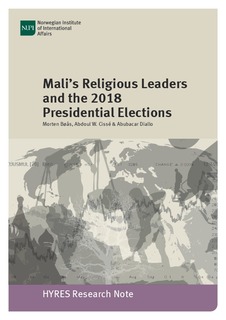| dc.contributor.author | Bøås, Morten | |
| dc.contributor.author | Diallo, Abubacar | |
| dc.contributor.author | Cissé, Abdoul Wahab | |
| dc.date.accessioned | 2019-07-17T06:30:58Z | |
| dc.date.available | 2019-07-17T06:30:58Z | |
| dc.date.created | 2019-06-26T15:33:14Z | |
| dc.date.issued | 2019 | |
| dc.identifier.uri | http://hdl.handle.net/11250/2605559 | |
| dc.description.abstract | Mali is by constitution a secular state, but here as elsewhere in the Sahel the role of religious leaders is increasing both in the social and the political sphere. This HYRES research brief explains how, why, and in what ways religious leaders tried to gain influence in the 2018 presidential campaign. While the research brief shows that there has been a fusion of politics and religion that can increase the political influence of Malian religious leaders, such engagement can also be a double-edged sword as Malians tend to see ‘politics as dirty’ and not a field that pious men of faith should get too deeply involved in. | |
| dc.language.iso | eng | nb_NO |
| dc.publisher | NUPI | nb_NO |
| dc.relation.ispartofseries | HYRES Research Note; | |
| dc.rights | Navngivelse-Ikkekommersiell-DelPåSammeVilkår 4.0 Internasjonal | * |
| dc.rights.uri | http://creativecommons.org/licenses/by-nc-sa/4.0/deed.no | * |
| dc.title | Mali's Religious Leaders and the 2018 Presidential Elections | nb_NO |
| dc.type | Research report | nb_NO |
| dc.description.version | publishedVersion | |
| dc.source.pagenumber | 14 | nb_NO |
| dc.identifier.cristin | 1708111 | |
| cristin.unitcode | 7471,0,0,0 | |
| cristin.unitname | Norsk Utenrikspolitisk Institutt | |
| cristin.ispublished | true | |
| cristin.fulltext | original | |

